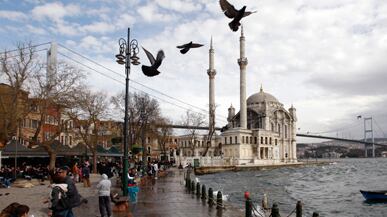With Egypt reinventing its political system after unprecedented popular uprisings toppled Hosni Mobarak's 30-year rule, some are looking to Turkey, a majority Muslim democracy with a history of military interventions, as a possible role model.
Turkey, just north of Egypt across the Mediterranean Sea, offers an "example of a predominantly Muslim country that has managed to opt for a democratic secular system," wrote Semih Idiz, a columnist for the Turkish paper Hurriyet.
Results of a recent poll by the Turkish Economic and Social Studies Foundation (TESEV) support a similar conclusion: Sixty-six percent of respondents—hailing from Egypt, Iran, Iraq, Saudi Arabia, Jordan, Lebanon, the Palestinian territories and Syria—said Turkey was a successful "blend" of Islam and democracy.
It is that "blend" that many say Egypt should now aspire to. Yet there are pitfalls in assuming that the Turkish example provides a perfect recipe for Egypt. The two countries bear certain similarities—predominantly Muslim populations of roughly equal size, the presence of conservative political parties such as the AKP and the Muslim Brotherhood (MB), and a powerful military—there are nuances, says Semin Gumusel, a Turkish journalist. Turkey's economy is four times larger than Egypt's, and its exports are sold across Europe and the Middle East; Egypt's are not. Turkey's experiment with a multiparty system started five in the 1950s; Egypt's is just beginning.
As the protesters in Egypt's Tahrir Square challenged Mubarak's rule, many Western capitals feared a takeover by the MB, the country's most organized, conservative group, which under Mubarak's regime was vilified for its Islamic tendencies. Now, though, some in the Western press are pointing to Turkey's AKP, a religious party with amicable ties to the West, as an example that could offer a road map for the MB to reinvent itself.
The challenge for the Egyptian military will be to avoid Turkey's pitfalls.

Even though the Muslim Brotherhood's younger generation often speaks of its admiration for the AKP, Michael Werz, an analyst at the Center for American Progress, remains cautious about drawing strong parallels between the two parties. The organization "will have a long way to go to become comparable with the AKP," Werz says. Turkey's AKP transformed itself after it broke with a more radical Islamist base to adapt in a multiparty atmosphere. The MB, however, in the absence of free and fair elections in Egypt, never had to compete with other political parties.
Another similarity between the two nations is the role of the military. In the last five decades, the Turkish military has intervened four times—in 1960, 1971, 1980 and 1997—to check the power of governments that it deemed a threat to the country's secular legacy; each of these interventions eventually resulted in a return to exclusively civilian control.
Currently, the Egyptian military is overseeing the country's transition, and it will do so perhaps for another six months. Just recently, The Supreme Military Council said that it intends to delegate power within that timeframe "to a civilian authority and a president elected in a peaceful and free manner that expresses the views of the people."
Steven Cook, a Turkey and Egypt expert at the Council on Foreign Relations, sees a parallel but argues that many differences remain.
According to Cook, the aftermath of those military coups in Turkey actually brought about a more authoritarian civil society. Pointing to the 1971 and 1980 coups in Turkey, he contends that "the military only handed power back to civilians after re-engineering Turkey's political institutions in a way that was decidedly undemocratic." In both of these cases, dissent from across the political spectrum became much harder, and those that didn't agree with the status quo were subjected to various punishments, including imprisonment and torture. The challenge for the Egyptian military will be to avoid similar pitfalls, and ensure the country's progress toward an all-inclusive political system.
Earlier this month, Turkish Prime Minister Recep Tayyip Erdogan said that "no government can cast aside the people's demands for democracy," and became one of the first leaders in the region to ask Mubarak to step down. Behind that remark was Erdogan's apparent confidence, stemming from his own recent electoral success. His party seems likely to remain in power for the third term after the national elections this summer. However, in order for Erdogan to have full credibility in calling for more democracy, he will also have to convince the skeptics who criticize him for what they say are authoritarian tendencies.
Last year, in a move which most believed was politically motivated, a major opposition newspaper received a tax fine in the amount of $2.5 billion after publishing reports critical of Erdogan's government. And arrests of hundreds of former military officials with alleged ties to an anti-government organization prompted criticisms that Erdogan was aiming to undermine the role of the military, long seen as the guardian of secularism. A national referendum proposing to reorganize the country's higher courts passed last year, boosting the AKP's confidence—yet it also raised eyebrows as critics contended that Erdogan's reform package resembled U.S. President Franklin D. Roosevelt's court-packing scheme in the 1930s.
Despite its shortcomings, Turkey's continuing experiment with democracy continues to inspire many ordinary citizens in a region that seems determined to challenge its deeply entrenched autocratic traditions.
Turkish elections this summer will also be a litmus test for democracy. If Erdogan keeps his word on his promises for major constitutional reform, critics of the AKP will have to reconsider their attacks. If he does not, many will argue that Turkey is no model for Egypt at all.
Afsin Yurdakul is a Turkish journalist. Her articles have appeared in Newsweek's Turkish Edition, msnbc.com and Foreign Policy.





